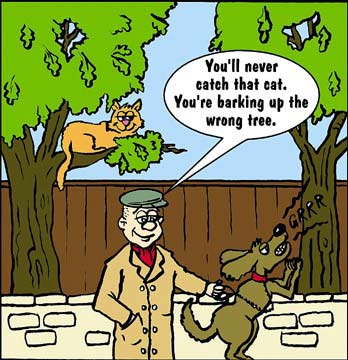Christin: You happy? You drove your own son out of the house!
這下你該高興了?你把自己兒子逼走了!
Howard's Mother: He's not a man. He's a puts!
他不算男人,只是個(gè)混蛋!
And don't you take that tone with me, you gold digger!
少拿那種口氣跟我說(shuō)話,你這個(gè)拜金女!
Christin: What'd you call me?
你叫我什么?
Howard's Mother: You heard me! And I'll tell you something else, you're barking up the wrong tree.
你聽(tīng)到了! 我跟你明說(shuō)吧,你勾搭錯(cuò)人了。
'cause as long as you're around, Howard is out of the will.
只要你在,遺產(chǎn)就沒(méi)他的份。
——《生活大爆炸》

美國(guó)人在十七世紀(jì)初來(lái)到北美洲大西洋沿岸的東部地區(qū)定居。此后,他們了花兩百多年時(shí)間來(lái)開(kāi)拓西部的大片處女地。在這期間,那些開(kāi)發(fā)西部的拓荒者經(jīng)常拿打獵獲得的小動(dòng)物作為他們的肉食,有時(shí)還利用它們的皮毛。他們還訓(xùn)練狗在打獵的時(shí)候?qū)W會(huì)把打中的動(dòng)物叼回來(lái)。可是,動(dòng)物為了逃命,往往會(huì)爬到樹(shù)上去。那些狗有時(shí)一糊涂沒(méi)看清楚動(dòng)物上了哪棵樹(shù),結(jié)果對(duì)著一棵沒(méi)有動(dòng)物的樹(shù)亂叫。這在英文里就是:To bark up the wrong tree.
隨著時(shí)間的推移,“to bark up the wrong tree”逐漸被公眾所接受,借喻“精力或目標(biāo)集中在錯(cuò)誤的地方”,例如:
If you think I can come up with more money, you're barking up the wrong tree.
如果你指望我拿出更多的錢(qián),那你打錯(cuò)算盤(pán)了。
To bark up the wrong tree,除了指“找錯(cuò)了人”之外還可以解釋為“錯(cuò)怪了人”,例如:
Hey man, if you think I was the guy who robbed that bank today, you're barking up the wrong tree! I was nowhere near the place."
喂,要是你認(rèn)為我是今天搶銀行的那個(gè)人,那你就錯(cuò)怪我了。我根本就沒(méi)上那兒去。











